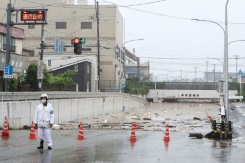
Scorching weather gripped three continents on Sunday, whipping up wildfires and threatening to topple temperature records as the dire consequences of global warming take shape.
Predictions of historic heat hung over swathes of Asia, Europe and the United States.
Japan issued heatstroke alerts to tens of millions of people in 20 of its 47 prefectures as near-record high temperatures scorched large areas and torrential rain pummelled other regions.
“Every time we’re visiting somewhere there seems to be a heatwave or like a rare weather disaster,” said Texan tourist Anthony Fernandez in Tokyo.
“It’s kind of becoming like the new normal… climate change is a big concern,” the 29-year-old said.
National broadcaster NHK warned the heat was life-threatening, with the capital and other places recording nearly 40 degrees Celsius (104 Fahrenheit).
Japan’s highest temperature ever — 41.1C first recorded in Kumagaya city, Saitama, in 2018 — could be beaten, according to the meteorological agency.
Some places experienced their highest temperatures in more than four decades Sunday, including Hirono town in Fukushima prefecture with 37.3C.
The United States National Weather Service reported that a powerful heatwave stretching from California to Texas was expected to peak during an “extremely hot and dangerous weekend”.

Arizona’s state capital Phoenix recorded 16 straight days above 43C, with residents facing temperatures of 47C on Saturday.
California’s Death Valley, often among the hottest places on Earth, is also likely to register new peaks on Sunday, with the mercury possibly surpassing 54C.
Southern California is fighting numerous wildfires, including one in Riverside County that has burned more than 7,500 acres (3,000 hectares) and prompted evacuation orders.
Further north, the Canadian government said wildfires had burned a record-breaking 10 million hectares this year, with more damage expected as the summer drags on.

- Historic highs forecast –
In Europe, Italians were warned to prepare for “the most intense heatwave of the summer and also one of the most intense of all time”.
The thermometer was still climbing after predictions of historic highs on Tuesday led the health ministry to sound a red alert for 16 cities including Rome, Bologna and Florence.
Temperatures are likely to hit 40C in Rome by Monday and 42C-43C on Tuesday, smashing the record of 40.5C set in August 2007.
Sicily and Sardinia could wilt under temperatures as high as 48C, the European Space Agency warned — “potentially the hottest temperatures ever recorded in Europe”.
The Acropolis in Athens, one of Greece’s top tourist attractions, closed for a third day running Sunday during the hottest hours.
Little reprieve is forecast for Spain, where the met agency warned of a new heatwave Monday through Wednesday taking temperatures above 40C in the Canary Islands and the southern Andalusia region.
On La Palma island, which endured a volcanic eruption in 2021, a fire burned 5,000 hectares this weekend forcing the evacuation of 4,000 people.
“I feel powerless to see how everything is burning,” Patricia Sanchez, a Spanish Red Cross worker, told AFP.
“To see two entire villages evacuated, to know that there are people who lost everything because of the volcano and have rebuilt their lives in the north, and now they are evacuated again and at risk of losing everything again,” the 37-year-old said.
- Killer rains –
Despite the heat, parts of Asia have also been battered by torrential rain.
In South Korea, rescuers on Sunday battled to reach people trapped in a flooded tunnel, after heavy rains for the last four days triggered floods and landslides that killed at least 37 people and left nine missing.
The country is at the peak of its summer monsoon season, with more rain forecast through Wednesday.
In northern Japan on Sunday, a man was found dead in a flooded car, a week after seven people were killed in similar weather in the country’s southwest.
In northern India, relentless monsoon rains have reportedly killed at least 90 people, following burning heat.
Major flooding and landslides are common during India’s monsoons, but experts say climate change is increasing their frequency and severity.
China on Sunday issued several temperature alerts, warning of 40-45C in the partly desert region of Xinjiang, and 39C in southern Guangxi region.
It can be difficult to attribute a particular weather event to climate change, but scientists insist that global warming — linked to dependence on fossil fuels — is behind the intensification of heatwaves.
The EU’s climate monitoring service said the world saw its hottest June on record last month.









